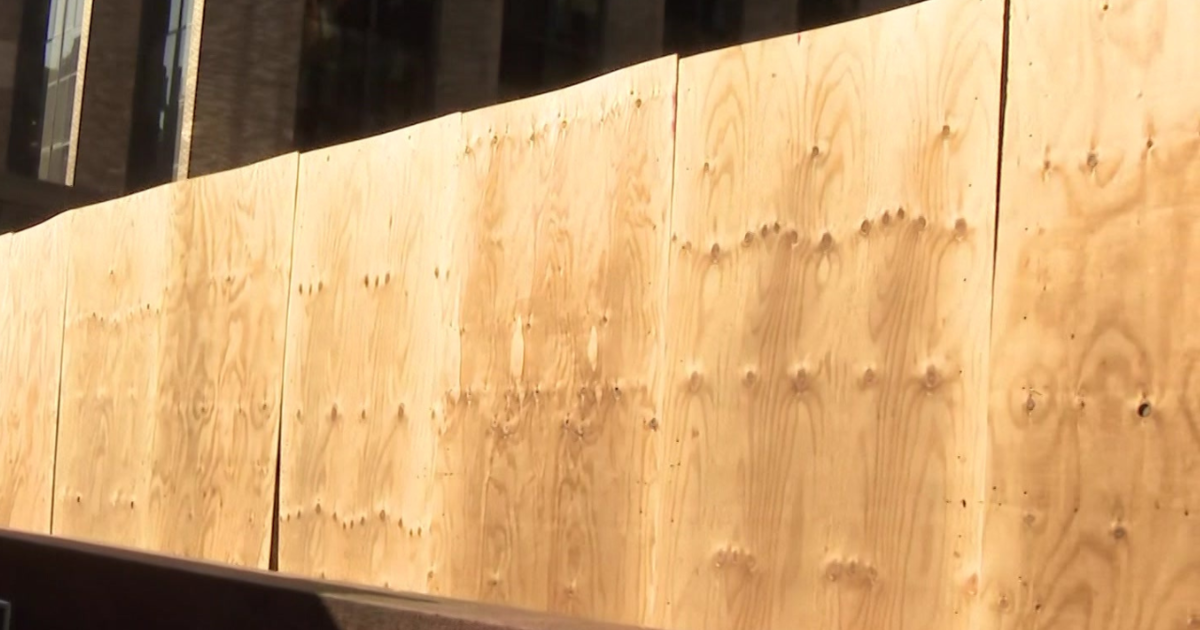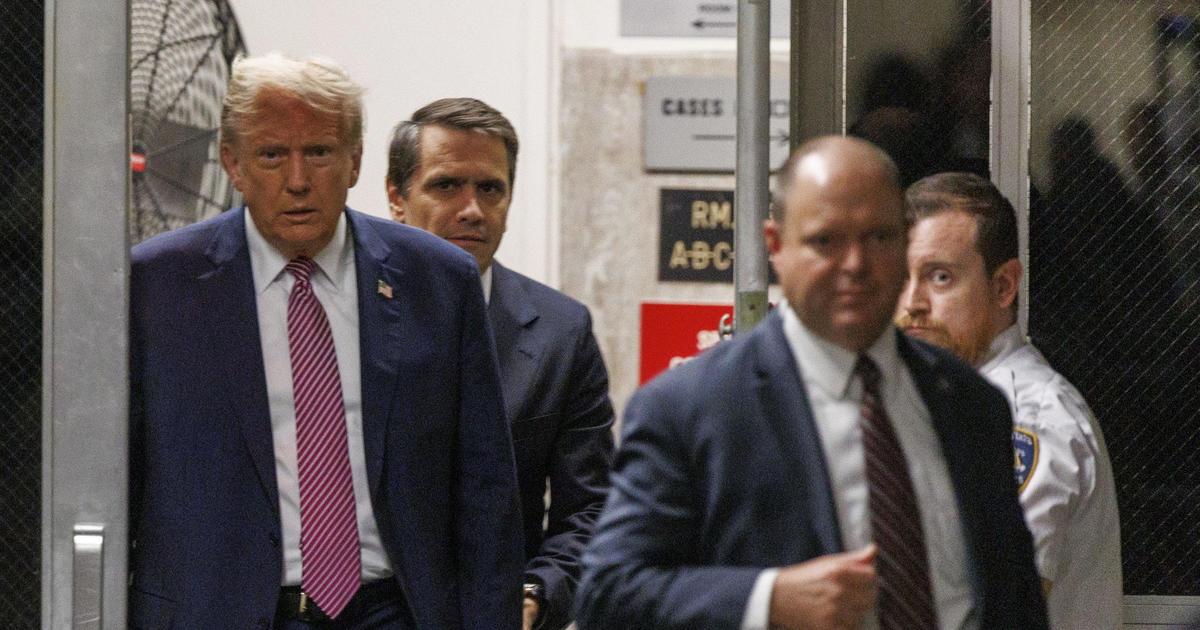Report: National Security Agency Gets Phone Records Of Verizon Customers
WASHINGTON (CBSNewYork/AP) -- The government is secretly collecting the telephone records of millions of U.S. customers of Verizon under a top-secret court order, according to the chairwoman of the Senate Intelligence Committee. The Obama administration is defending the National Security Agency's need to collect such records, but critics are calling it a huge over-reach.
Sen. Dianne Feinstein, D-Calif., told reporters Thursday that the court order for telephone records, first disclosed by The Guardian newspaper in Britain, was a three-month renewal of an ongoing practice.
"I think people want the homeland kept safe to the extent we can,'' Feinstein said at a Capitol Hill news conference. "We want to protect these privacy rights. That's why this is carefully done in federal court with federal judges who sit 24/7 who review these requests.''
Rep. Mike Rogers (R-Mich.), who sits on the House Select Committee on Intelligence, said the program has already paid huge dividends.
"The reason they use this, and I can tell you why this program is important, that within the last few years, this program was used to stop a...terrorist attack in the United States, we know that," Rep. Rogers said Thursday.
The disclosure raised a number of questions: What is the government looking for? Are other big telephone companies under similar orders to turn over information? How is the information used and how long are the records kept?
Separately, The Washington Post and The Guardian reported late Thursday the existence of another program used by the NSA and FBI that scours the nation's main Internet companies, extracting audio, video, photographs, emails, documents and connection logs to help analysts track a person's movements and contacts. It was not clear whether the program, called PRISM, targets known suspects or broadly collects data from other Americans.
The companies include Microsoft, Yahoo, Google, Facebook, PalTalk, AOL, Skype, YouTube and Apple. The Post said PalTalk has had numerous posts about the Arab Spring and the Syrian civil war. It also said Dropbox would soon be included.
CBS News senior correspondent John Miller is a former Deputy director of National Intelligence. Miller said the key to the Verizon data collection is not content but numbers that might link terrorists to U.S. citizens.
"Everybody at the NSA knows if they are listening in on American citizens without a very special order or ruling from their lawyers then they are going to jail," Miller said Thursday on "CBS This Morning."
Miller also explained how the use of records works.
"When you rub data against data, you get more results. Metadata is data about data. So if you're watching 1,000 suspected terrorist numbers in Pakistan and Afghanistan and you want to mix that against a particular threat, you see that this number is in contact with 50 other numbers, but three of them are in the United States. Does that mean that a terrorist there has a cousin in Chicago?"
The sweeping roundup of U.S. phone records has been going on for years and was a key part of the Bush administration's warrantless surveillance program, according to a U.S. official.
Report: National Security Agency Gets Phone Records Of Verizon Customers
"This is about using what they call big data to make connections and that's how they've exploded this over the years and it has led to the prevention of more than one terrorist plot, including one targeting New York City," Miller told WCBS 880 on Thursday evening.
"I think the privacy question is going to be addressed by what defines privacy. If they were accessing all of our names and addresses and listening in to our calls, that would be a big concern. The idea that they are running known terrorists' telephone numbers against hundreds of millions of numbers and only looking at the ones where some direct connection comes up and only being able to look beyond the metadata connection that they machine makes to figure out who's behind that number, who owns it - well, to do that, they actually have to engage in a legal process," Miller told WCBS 880.
The White House had no immediate on-the-record comment. Attorney General Eric Holder sidestepped questions about the issue during an appearance before a Senate subcommittee, offering instead to discuss it at a classified session that several senators said they would arrange.
The order was granted by the secret Foreign Intelligence Surveillance Court on April 25 and is good until July 19, the Guardian reported. It requires Verizon, one of the nation's largest telecommunications companies, on an "ongoing, daily basis,'' to give the NSA information on all landline and mobile telephone calls of Verizon Business in its systems, both within the U.S. and between the U.S. and other countries.
The document shows for the first time that under the Obama administration, the communication records of millions of U.S. citizens are being collected indiscriminately and in bulk, regardless of whether the people are suspected of any wrongdoing.
A former U.S. intelligence official who is familiar with the NSA program said that records from all U.S. phone companies would be seized by the government under the warrants, and that they would include business and residential numbers.
Reaction to the revelation -- both pro and con -- reflected the vigorous debate in Washington over how best to balance the sometimes-competing goals of protecting the nation from terror attacks while safeguarding the privacy and civil rights of Americans.
President Barack Obama, in a recent national security address, said the nation is at a crossroads as it determines how to remain vigilant yet move beyond a post-9/11 mindset focused on global antiterrorism.
"I think the American people deserve to know whether their government is scooping up all of their phone records, regardless if they did anything wrong," said Cindy Cohn of the Electronic Frontier Foundation.
Former Vice President Al Gore tweeted that privacy was essential in the digital era.
"Is it just me, or is secret blanket surveillance obscenely outrageous?'' wrote Gore, the Democrat who lost the 2000 presidential election to George W. Bush.
Vermont's Sen. Bernie Sanders, an independent whose comments were echoed by members of both parties, said: "To simply say in a blanket way that millions and millions of Americans are going to have their phone records checked by the U.S. government is to my mind indefensible and unacceptable.''
But Sen. Lindsey Graham, R-S.C., said he had no problem with the court order and the practice, declaring, "If we don't do it, we're crazy.''
"If you're not getting a call from a terrorist organization, you've got nothing to worry about,'' he said.
Arizona Sen. John McCain, who ran against Obama for president in 2008, said that if the records sweep was designed to track "people in the United States who are communicating with members of jihadist terrorist organizations,'' that might not be a problem. "But if it was something where we just blanket started finding out who everybody called and under what circumstances, then I think it deserves congressional hearings.''
Some critics have concerns that the untargeted surveillance goes too far.
"I think the American people deserve to know whether their government is scooping up all of their phone records, regardless of whether they did anything wrong," Cindy Cohn with the Electronic Frontier Foundation said.
New Yorkers have mixed feelings on the snooping.
"We have a right to keep our own privacy and we have a right to do what we want with our own phones," one woman told CBS 2's Dick Brennan.
"It protects us as a nation. If it's to fight terrorism, if it's to fight our will as Americans to be safe," a man said.
The disclosure of the records sweep was just the latest controversy to hit the Obama administration.
The president also is facing questions over the Internal Revenue Service's improper targeting of conservative groups, the seizure of journalist phone records in an investigation into who leaked information to the media, and the administration's handling of the terrorist attack in Libya that left four Americans dead.
At the very least, the controversies threaten to distract the White House at a pivotal time, when the president wants to tackle big issues like immigration reform and taxes. At most, the controversies collectively could erode the American people's trust in him, threatening both to derail his second term agenda and sully his presidential legacy.
The court order did not authorize snooping into the content of phone calls. But with millions of phone records in hand, the NSA's computers can analyze them for patterns, spot unusual behavior and identify what are known in intelligence circles as "communities of interest'' -- networks of people in contact with targets or suspicious phone numbers overseas.
Once the government has zeroed in on numbers it believes are tied to terrorism or foreign governments, it can go back to the court with a wiretap request. That allows the government to monitor the calls in real time, record them and store them indefinitely.
The court document related to Verizon offers a glimpse into the larger NSA effort. Under the law, the government would need to demand records from each phone company individually. While subpoenas for other phone companies have not been made public, for the data-mining program described by government officials to work, the government would need records for all providers.
Jim Harper, a communications and privacy expert at the libertarian-leaning Cato Institute, questioned the effectiveness of using so-called pattern analyses to intercept terrorism. He said that kind of analysis -- finding trends in transactional data collected by Verizon -- would produce many false positives and give the government access to intricate data about people's calling habits.
"This is not just entertainment or a sideshow. This is a record of who you called every day this month,'' he said, urging Congress to require the government to provide "a full explanation'' of how this data turns up terrorism plots.
Under Bush, the National Security Agency built a highly classified wiretapping program to monitor emails and phone calls worldwide. The full details of that program remain unknown, but one aspect was to monitor massive numbers of incoming and outgoing U.S. calls to look for suspicious patterns, said an official familiar with the program. That official spoke on condition of anonymity because he was not authorized to discuss it publicly.
After The New York Times revealed the existence of that wiretapping program, the roundup continued under authority granted in the USA PATRIOT Act, the official said.
The official did not know if the program was continuous or whether it stopped and restarted at times.
The official had not seen the court order released by the Guardian newspaper but said it was consistent with similar authorizations the Justice Department has received.
Verizon spokesman Ed McFadden said Wednesday the company had no comment.
The NSA had no immediate comment. The agency is sensitive to perceptions that it might be spying on Americans. In a brochure it distributes, which includes a DVD for reporters to view video that it provides for public relations purposes, it pledges that the agency "is unwavering in its respect for U.S. laws and Americans' civil liberties -- and its commitment to accountability,'' and says, "Earning the American public's trust is paramount.''
Verizon Communications Inc. listed 121 million customers in its first-quarter earnings report this April - 98.9 million wireless customers, 11.7 million residential phone lines and about 10 million commercial lines. The court order didn't specify which customers' records were being tracked.
Under the terms of the order, the phone numbers of both parties on a call are handed over, as are call time and duration, and unique identifiers. The contents of the conversation itself are not covered, The Guardian said.
A senior administration official, defending the collection of phone records by the government, said, "On its face, the order reprinted in the article does not allow the government to listen in on anyone's telephone calls.'' The official spoke on condition of anonymity because the official was not authorized to discuss the matter publicly.
Interviewed separately, the former intelligence official described a system in which the database needed to be kept current so that if intelligence agencies obtained a phone number from a terror suspect overseas, it could immediately be matched against the records on file. Because it is not easy or quick to obtain the records from phone companies, the Obama administration needed to renew the Bush-era program on an ongoing basis to keep it updated, the former official said.
It's not clear how long the records are kept, or if they are destroyed. The former official said that since terror suspects frequently change phone numbers to cover their tracks, there is little need for older records.
Congressional intelligence agencies were briefed extensively on the program, and received support from both Republicans and Democrats to continue it, the former official said. "Some were nervous about it, but there was never any attempt to stop the program,'' he said. He described it as a White House-led process.
The broad, unlimited nature of the records being handed over to the NSA is unusual. FISA court orders typically direct the production of records pertaining to a specific named target suspected of being an agent of a terrorist group or foreign state, or a finite set of individually named targets. NSA warrantless wiretapping during the George W. Bush administration after the 9/11 attacks was very controversial.
The FISA court order, signed by Judge Roger Vinson, compelled Verizon to provide the NSA with electronic copies of "all call detail records or telephony metadata created by Verizon for communications between the United States and abroad'' or "wholly within the United States, including local telephone calls,'' The Guardian said.
Some watchdog groups said they believe it's likely similar orders exist for other phone and Internet companies. The idea is that the government would need records from all providers for the program to work.
The law on which the order explicitly relies is the "business records'' provision of the USA Patriot Act.
Check Out These Other Stories From CBSNewYork.com:
(TM and © Copyright 2013 CBS Radio Inc. and its relevant subsidiaries. CBS RADIO and EYE Logo TM and Copyright 2013 CBS Broadcasting Inc. Used under license. All Rights Reserved. This material may not be published, broadcast, rewritten, or redistributed. The Associated Press contributed to this report.)



